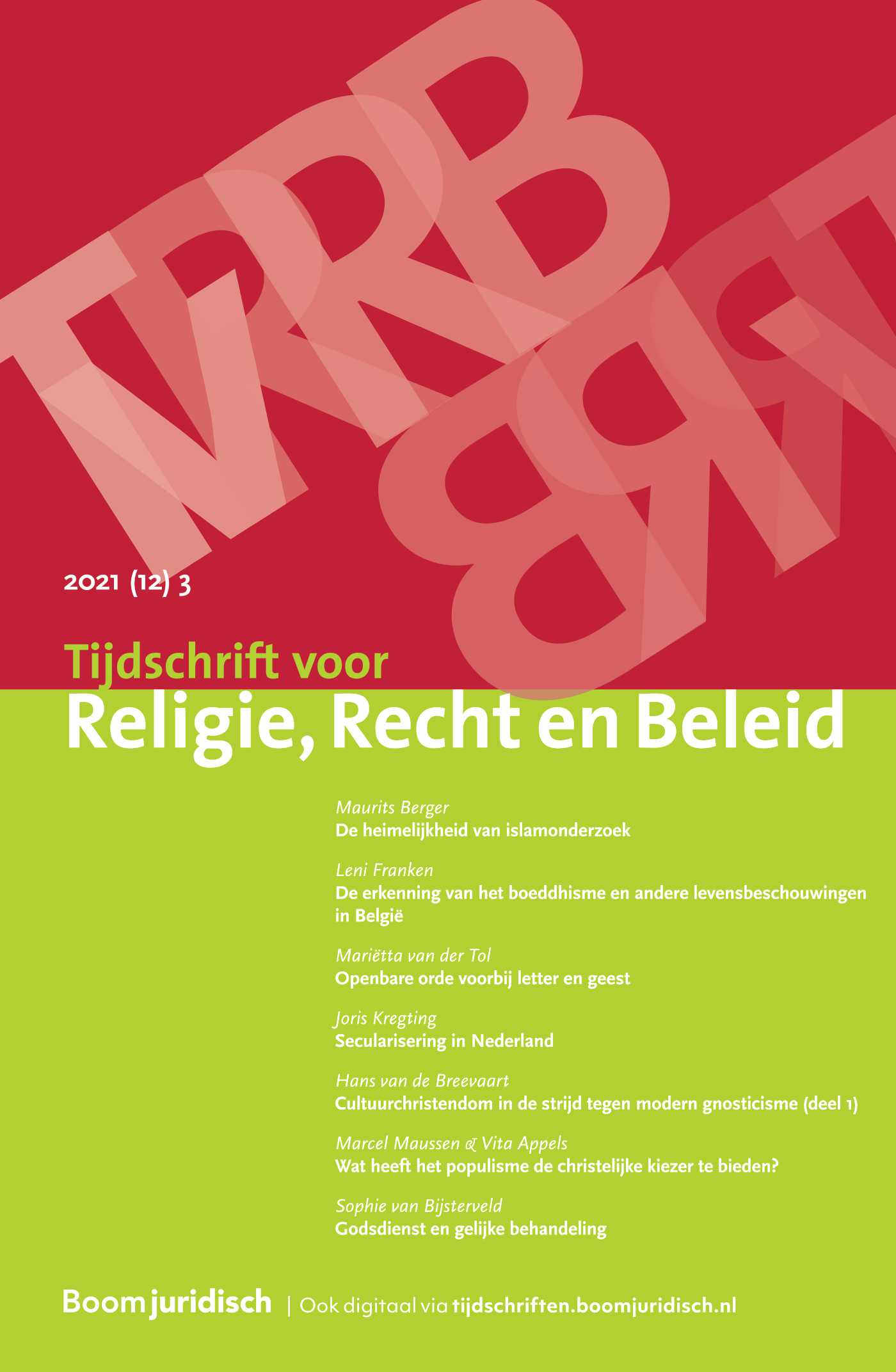|
The liberal stance regarding religious freedom starts from a particular anthropology, which holds that in order to become fully human citizens must be able to build their lives on the foundations of their religious convictions. This starting point leads to distinctive conceptions of constitutionalism and democracy that make it possible for citizens to keep faith in liberal democracy. The so-called new critics of religious freedom, to the contrary, run the risk of eventually eroding trust in government by putting their substantial ideas of liberal democracy first and demanding of citizens and their organizations to act in conformity with these ideas. |


Tijdschrift voor Religie, Recht en Beleid
Meer op het gebied van Algemeen
Over dit tijdschriftMeld u zich hier aan voor de attendering op dit tijdschrift zodat u direct een mail ontvangt als er een nieuw digitaal nummer is verschenen en u de artikelen online kunt lezen.
| Redactioneel |
Coalitie en religie |
| Auteurs | Ben Koolen |
| Auteursinformatie |
| Artikel |
|
| Trefwoorden | Godsdienstvrijheid, Constitutionalisme, Democratie, Mensvisie, liberale democratie |
| Auteurs | Mr. dr. Hans-Martien ten Napel |
| SamenvattingAuteursinformatie |
| Artikel |
Vergeten religie in NederlandDe herontdekking van vergeten aspecten van religie in het maatschappelijke debat |
| Trefwoorden | joods-christelijk, Herinnering, Vergeten, Receptie |
| Auteurs | Dr. Peter-Ben Smit |
| SamenvattingAuteursinformatie |
|
Appeals to religion in the public domain, in particular by politicians, prove to be controversial. This is good news, given that the ensuing debate usually uncovers forgotten aspects of religious traditions. Using three cases from the Dutch political discourse, to wit: the appeal to ‘Jewish Christian’ tradition, the claim that Jewish Christian tradition has been of key emancipatory value, and the identification of immigrants as religious, and applying Aleida Assmann’s theory about the dynamics of forgetting (and remembrance), the paper demonstrates that in each of these cases, the public debates surrounding these instances of references to religion and their rhetorical use, were instrumental in uncovering ‘forgotten’ aspects of religion that had disappeared from the ‘memory’ of the political discourse. |
| Artikel |
Het weigeren van bloedtransfusies en vaccinaties op grond van godsdienstige motievenEen grondrechtelijk perspectief |
| Trefwoorden | vrijheid van godsdienst, lichamelijke integriteit, Vaccinatieplicht, Bloedtransfusies |
| Auteurs | Mr. dr. Aernout Nieuwenhuis |
| SamenvattingAuteursinformatie |
|
Some religious persons refuse to undergo certain medical treatments such as vaccinations or blood transfusions. They refuse treatment not only for themselves but for their children as well. Many fundamental rights may be at stake here: freedom of religion, the right to physical integrity and respect for family life on the one hand, and the duty of public authorities to provide for health care and defend children’s rights on the other. The main topic of this contribution is the extent to which the government is allowed to make certain treatments compulsory. |
| Artikel |
Particuliere ‘binnenkamer’ en openbaar klaslokaalNederlandse liberalen over religie in de politiek en het bijzonder onderwijs |
| Trefwoorden | Liberalen, privésfeer, Beginselen, Pacificatie, openbare school |
| Auteurs | Dr. Patrick van Schie |
| SamenvattingAuteursinformatie |
|
For liberals religion is a private matter. This does not mean that a citizen should leave his or her religion at home. It does mean that laws and public services should not be determined by religious beliefs. The article describes how liberals have looked upon religion in their programs of principles since mid 19th century. The educational arrangement in the Netherlands of 1917, favouring religious schools, did not satisfy them. What were the liberal proposals in order to safeguard the religiously neutral, publicly-maintained schools? |

